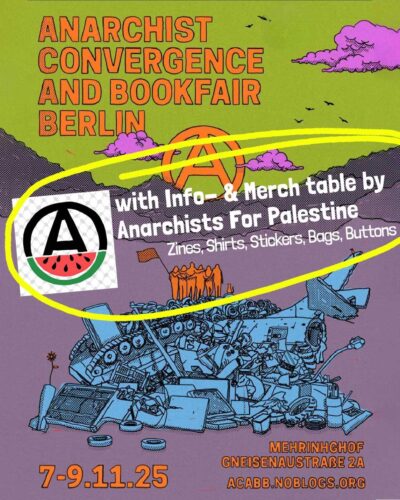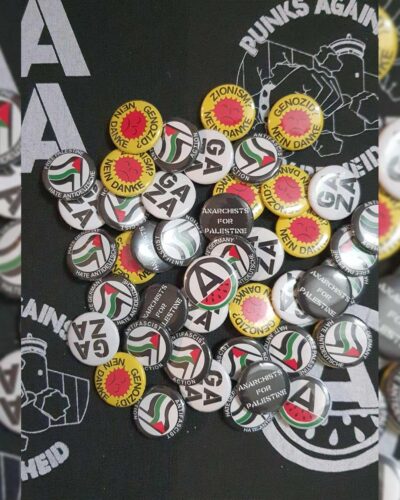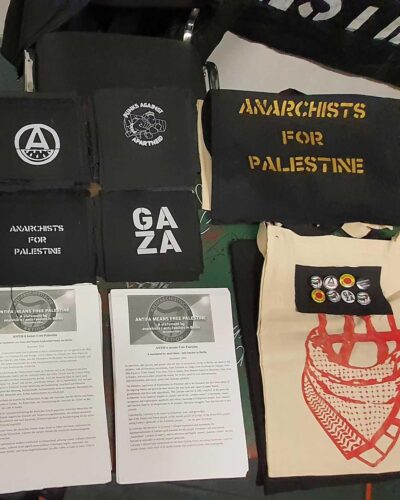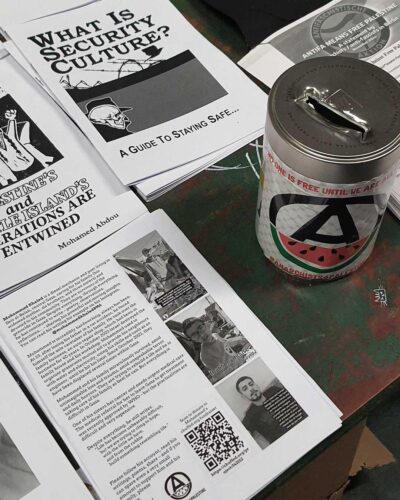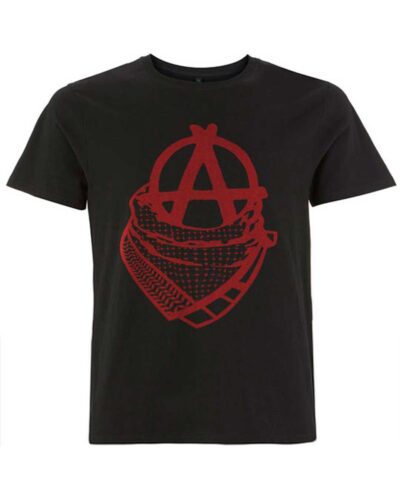⚲ 07.–09.11.2025 | Mehringhof (Gneisenaustr. 2A, 10961 Berlin)
PROGRAM: https://acabb.noblogs.org/program/
with Info- and merch table by Anarchists For Palestine: Zines, Shirts, Stickers, Bags, Buttons.
EVENT-RECOMMENDATION:
For an Anarchic Internationalism
Saturday 8th of November, 14:00 Mehringhof
Anarchists — particularly in the West— have often struggled to engage with national liberation and anti-colonial movements. Too often, anarchism’s history has been presented as a story of European cis men, individual freedom, and universalism that seeks to be detached from the anti-colonial struggles. This erasure not only distorts the history of anarchism, it also weakens our ability to act in solidarity today.
We invite comrades to join us in this conversation — not as an endpoint, but as a step toward re-examining and rebuilding our anarchic internationalist and anti-colonial practices now and here.
- How can we as anarchists in Berlin support anti-colonial struggles without subsuming them under Western frameworks?
- How can we practice anarchic solidarity that respects difference without falling into identity politics, cultural relativism, and exoticism?
- How can we overcome knowledge extractivism and instead treat each other as equals, and engage in honest exchange?
- Can we recognize internationalist practices as joint work across territories, rather than as misunderstanding them as solely “offerings” from the West?
It even manifests in the form of difficulties in Berlin when we fail to understand that we don’t all come from the same background. Because, at the end of the day, there are many anarchic (her)stories that converge – also in the preparation of this one single event. For some, the relation to anarchism as a set of ideas has been at the center of their definition. For others, a critical engagement with the history of anarchism is crucial.
Experiences from outside europe bring in the importance of local anarchic practices based on anti-colonial ideas as a path to liberation from the oppression of ideologies locked into supremacist concepts.
Despite the differences, being in the same city, many find each other facing the same problems.
The detachment of anarchism in Berlin from anti-colonial ideas not only created knowledge gaps by cutting connections, it also isolated fights in the Global South. Moreover, it has declined in “bi-national” soli work, where the people are in solidarity with specific fights. Zapatistas in the 90s, the Kurdish struggle in the 2000s, and recently Palestine. This not only recalls the capitalist consumerist way of following trends, but also allows for the foundations of colonialism to remain intact: white people are deciding what is important, and so far their solidarity is shown a fight can gain power.
With these examples in mind, but mostly with our own anarchic practice as a discussion point, we aim to build up a terrain for honest discussion and self-criticism. We do not want to uncritically celebrate nor exoticize struggles in the Global South, but to understand the tensions, contradictions, and uneven power relations that have often shaped solidarity in a city like Berlin.
Over the years, we have encountered these forms of internationalism — in demonstrations, refugee camps, solidarity networks, and liberated spaces. Each encounter brought lessons, contradictions, and moments of tension. Sometimes, our forms of activism were met with scepticism; sometimes, we realized that our frameworks and words were not enough. But these moments of friction are precisely where learning and transformation begin.
This event seeks to reopen and reimagine our anarchic practices through the lenses of anti-colonial and national liberation struggles that makes us take our own stance and forged opinion.
What does it mean for anarchists in Berlin to support liberation movements elsewhere? How do we avoid reproducing paternalism, tokenism, or the tendency to imagine ourselves “speaking for” others, while still acting in solidarity? Are we as anarchists in the West able to have an anti-colonial position that can break through the capitalist impositions?

